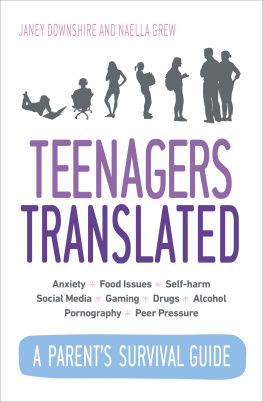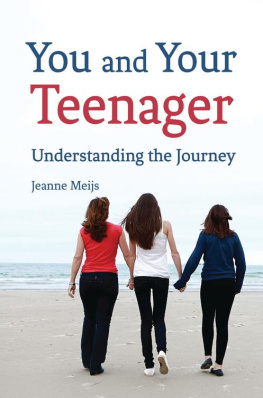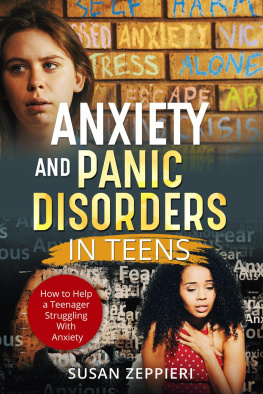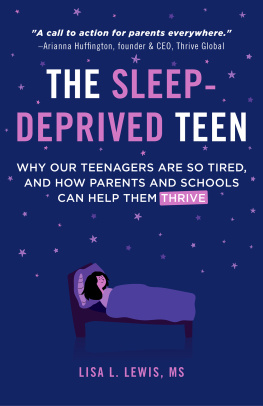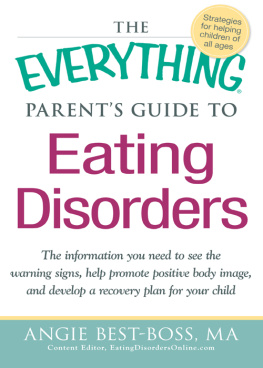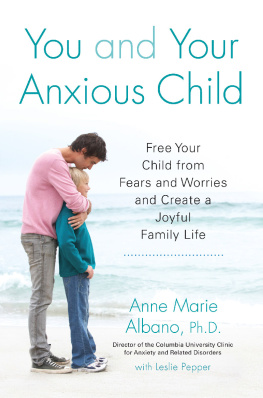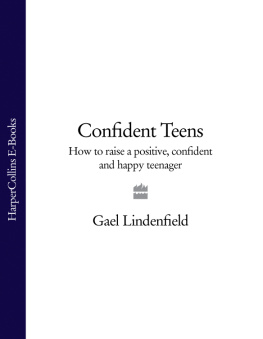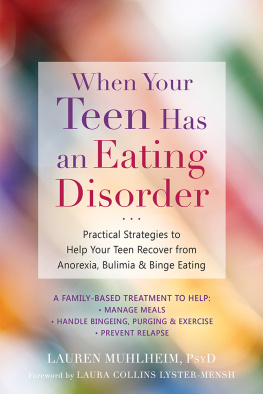CONTENTS
ABOUT THE BOOK
Family therapist in a book
The teenage years are acknowledged to be the most testing stage of parenting when well-mannered and obedient children can transform into rude and rebellious teens. However, parenting a teen doesnt have to be a battle, and counsellors Janey Downshire and Naella Grew have developed a programme to help parents get the best out of the teenage years.
Their approach is positive and straightforward, providing simple strategies for nurturing better behaviour and providing a happy, supportive home environment.
The book will tackle:
- How to help teens feel supported and secure
- Strategies for improving communication
- Dealing with digital technology and media influences
- Ways to encourage self-confidence and independence
- Coping with challenging behaviour, attitudes and pastimes
- Plus: drinking, drugs, smoking, sex, porn, video games, bullying, peer pressure, loneliness and eating disorders
This book provides a positive, enthusiastic and inspiring approach to the teenage years, showing how parents can help their teens develop the skills they will need for a happy adult lives.
ABOUT THE AUTHORS
Janey and Naella are both qualified counsellors who specialise in teenage development and emotional literacy. Together they run Teenagers Translated a business focused on aiding and guiding both parents and adolescents through the teenage years. They run courses, workshops and talks over the UK to help people cope with teenage-related issues.
www.teenagerstranslated.co.uk
For Wiz, Bea, Ned, Claudia, Catriona, Alex & Sam
INTRODUCTION
Your beliefs become your thoughts, Your thoughts become your words, Your words become your actions, Your actions become your habits, Your habits become your values, Your values become your destiny.
Mahatma Gandhi
Parenting is the most important and difficult job we ever undertake and yet we get no training, little praise, gratitude or encouragement and no prospect of retirement. Whatever we do as parents, a certain amount of teenage turmoil is unavoidable and we need to accept that. But the passage can be smoother and this book aims to help you not only adopt a more proactive approach in order to prevent emotional and mental health decline, but also to understand how to prevent these issues from developing and gathering intensity. The information is relevant to all parents, not only those who are struggling with problems.
The teenage years are no longer a short step from 13 to 19, so we need to reassess what we mean by this period. With children growing older younger, you may see glimpses of teenage potential in your 10-year-old. Some households may still be subsidising a child well into their twenties while they struggle to become self-supporting. This is now a much more prolonged period of parenting, possibly lasting up to 14 years, so we need to understand what is going on in this phase and to be as well prepared for it as possible.
This book aims to help raise your self-awareness of how you are and what you are doing when in parent mode. Understanding ourselves (our reactions, responses and behaviour) helps us to develop empathy, leaving us more able to understand our children. Their culture, morality, values and beliefs about what is normal are different to how it was for us. Laddish drunkenness, early promiscuity, technology addiction, pornography, anxiety and depression are just some of the issues we may have to face in our families. Perhaps this sea change in what is considered to be normal is the consequence of the digital age, where the opinions and escapades of others invade our homes, altering perceptions of what is now deemed acceptable practice. Despite having been teenagers ourselves, we may feel less confident about what to do and ill-equipped to do it.
A lot of what goes on with teenagers is explained by how the brain changes and develops in adolescence, so this is an important thread in the book. If we want to play a proactive part in how our child is shaping up, this book helps us look at those aspects of parenting and family life that will help us do this. Our central message is that what we do as parents matters an awful lot. The What can I do about their behaviour? It is out of my hands attitude is unhelpful. What we now know, through research in a multitude of disciplines, is that simple everyday parenting practices can have a very positive or negative impact on a childs developing mental health, wellbeing and behaviour. Any out-of-the-ordinary behaviour is expressing an underlying emotional need and should indicate to us that this is where we need to focus our attention.

If our teenagers world seems confusing and out of our control, we would argue that it has never been more important for us as parents to think about what we want and what is acceptable in our own households in order to reclaim our natural position of adult authority, influence and guidance. A set of clear, unambiguous, consistent values and boundaries at home will provide our children with the chance to develop their own moral compass as opposed to being manipulated into peer views and activities. They have to learn to respect limits and adapt to different rules, be it at home, someone elses home, school, work or society as a whole, because their behaviour impacts other people. But a familiar message reverberates around many households: Its so unfair, everyone else is allowed to. The hard thing is to hold out for what is right for your family, so not only is it a question of laying down boundaries, but also of upholding them at the risk of being unpopular with your children.
Parenting is sensitive and emotive stuff. We all want to get it right and be good enough parents. Most of us take our cue from our own experience as children. Either we stick rigidly to the familiar path laid out by our own parents, or if that route did not work out well for us (too strict or too lax), or because society is very different today, we may decide to do things differently. Although our parents probably didnt think about parenting very much, the world is different now and it would be a risky strategy to cross our fingers and hope for the best. Managing todays mental health problems is more complicated and requires more self-awareness, understanding and active parental engagement in order to be effective in preventing decline.
Alongside this, the parentchild dynamic has undergone a seismic shift too. Adults are no longer automatically looked up to, relied upon, respected and obeyed for their wisdom and expertise. Our opinions as parents appear to matter less and many teenage views about what is and isnt okay are moulded by their peers and the internet. Although the internet undoubtedly has huge benefits, it also plays a sinister role in a childs developing psyche by helping to challenge and modify beliefs about what is normal.
The reality is that our teenagers live in a highly competitive world. Whether intentionally or driven by fear of failure, many parents have joined the push to help their child be the best. We need to ask ourselves if our expectations are too high. Are we helping too much and inadvertently dis-abling them? Might we be contributing to some of the mental problems we then struggle to manage? Have we fallen victim to the needs and wants of materialism? Reflecting on these questions, among others, will help us work out whether anything we are doing is unwittingly adding to the angst in our households.

